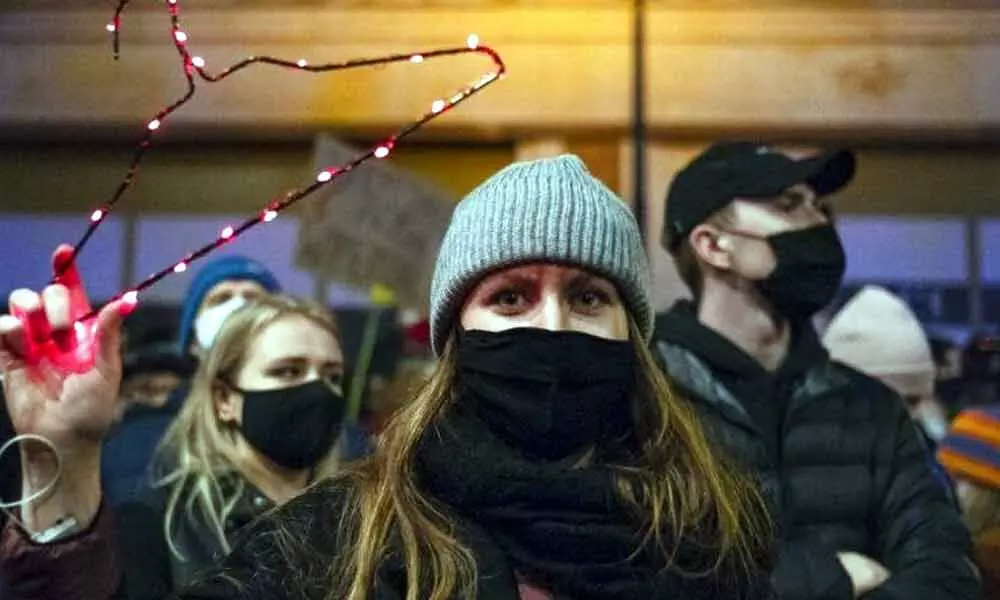Rage and hope fuel women's revolt over abortion in Poland

A demonstrator holds a coat-hanger, a symbol of the self-induced abortion, during a protest against a top court ruling restricting abortions in Warsaw, Poland. (Photo | AP)
The upheaval began when Poland's constitutional court, packed with loyalists of the conservative ruling party, ruled Oct.22 to ban abortions in cases of congenital fetal defects.
Warsaw: Karolina Micula had used her bare chest in political protest once before.
When Poland's right-wing government first tried to restrict abortion rights, the actress and singer delivered an intense performance onstage in Wroclaw in 2017 that included her spreading paint in the national colors - white and red - onto her breasts and face, ending with a fist raised high.
When the authorities tried again to impose a near-total ban on abortion in October this year, Micula, along with a friend, again stripped to her waist and stood on top of a car at a busy Warsaw intersection during a protest, holding a flare high and giving the middle finger.
A woman's body is a place of political battle, the 32-year-old said from her Warsaw apartment in an interview.
My gesture meant that I will do with my body whatever I want to do with it. If I want to stand naked in front of people, I will do it, because it's my choice.
Micula's friend had just come from physiotherapy following a double mastectomy and wanted to encourage other protesters by showing her tattooed chest.
Theirs is among many taboo-breaking acts by furious women in Poland in the past weeks.
The upheaval began when Poland's constitutional court, packed with loyalists of the conservative ruling party, ruled Oct.22 to ban abortions in cases of congenital fetal defects, even if the fetus has no chance of survival.
Poland already had one of Europe's most restrictive abortion laws, and the ruling would mean that the only legal reasons for abortion would be rape, incest or if the woman's life is in danger.
Jaroslaw Kaczynski, the ruling party leader and Poland's most powerful politician, had said he wanted even nonviable fetuses to be carried to birth, so they can be given a baptism, a name and a burial.
The rage of Polish women, and many men as well, erupted onto the streets across the country, growing into the largest protest movement in the three decades since communism fell.
Protesters at first disrupted Masses, shouted obscenities at priests and spray-painted the number of an abortion hotline on church facades.
Those early provocative tactics were largely dropped after they triggered a backlash in a society where many cherish Catholic traditions.
They continued their protests on the streets, however, refusing to be cowed by the authorities or by the pandemic.
My water has broken.
I am delivering a revolution, said one sign at a protest in Warsaw on Nov.
18, expressing a view held by an increasing number of protesters.
The interior minister recently warned that the government would not tolerate a revolution made by force against the constitutional organs of the Polish state.
Police have been increasingly detaining and charging protesters, and in some cases using tear gas and other force.
Still, amid the massive social upheaval, the government has not formally implemented the court ruling and has spoken of coming up with a new law.
But reproductive rights activists say that hospitals are already refusing to carry out abortions of congenitally damaged fetuses.
The governing party's attempt to ban abortion, with the use of a court packed with loyalists and during a pandemic, seemed excessively cruel to 21-year-old Nina Michnik, a student of Arabic studies and philosophy.
They did it in this critical moment when everyone was scared of the pandemic, said Michnik.
She described feeling extremely lonely and fragile when the court ruling came down.
They caught us in this very sensitive moment, Michnik said.
That's why we were so angry.
While she was stuck at home by the country's coronavirus lockdown, Michnik had stopped the boxing workouts she loves.
After the protests erupted, she began working out again and joined a group that scans protests for far-right troublemakers.
The recent protests have certainly become a political awakening for Polish youth, but older Poles also have taken part.
They are led by the Women's Strike, a group of female activists, but many men have also joined in.
What began as a revolt against an abortion ruling has become a larger struggle for democracy and human rights.
Before the court ruling, the people on the front lines of Poland's culture war had been LGBT rights activists who were frequently denounced by government and church leaders as a threat to Poland's culture and families.
Those grievances have now been woven together into one larger struggle against a government that the protesters hope to eventually bring down.
Rainbow flags are held high at all the abortion protests.















